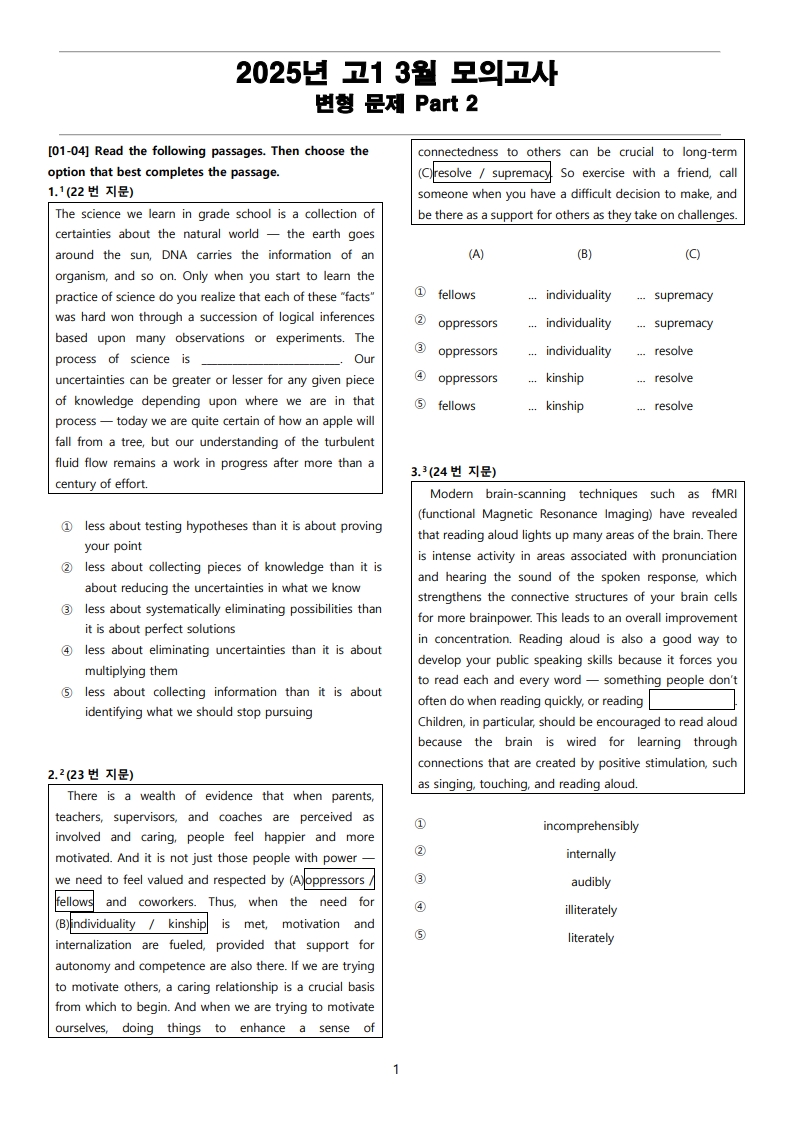2025년 고1 3월 전국 연합 모의고사
변형 문제 Part 2
일반 워크북 형태의 문제에서 벗어나 The Makings가 만든
2025년 고1 3월 전국 연합 모의고사 변형 문제 Part 2
출판사에서 오랫동안 영어 번역과 교정을 하셨던 원어민 선생님과
현직에서 강사를 하고 있는 연구진들이 학생들을 위한 최상의
2025년 고1 3월 전국 연합 모의고사 변형 문제 Part 2 를 선보입니다.
사고력과 이해력을 요구하는 문제들로 내신 대비 뿐만이 아니라
수능도 한꺼번에 공부하실 수 있는 자료입니다.
중간고사&기말고사 전에 더메이킹스(The Makings)에서 제작한
2025년 고1 3월 전국 연합 모의고사 변형 문제로 마무리 하세요.
정답 확인 하러가기!
2025년 고1 3월 전국 연합 모의고사 변형 문제 Part 2 (44문항) (PDF)
2025년 고1 3월 전국 연합 모의고사 변형 문제, 내신대비, 영어내신자료,고등영어자료, 모의고사 변형문제,전국 연합모의고사 변형자료, 모의고사 영어 서술형 대비, 대치동 고등 영어자료, 대치
themakg.imweb.me
themakings.co.kr
The Makings의 2025년 고1 3월 전국 연합 모의고사 변형 문제는
총 11개의 유형으로 구성되어 있습니다.
1. 빈칸 채우기(객관식)
2. 글의 내용 일치/불일치(객관식/한글 선택지)
3. 글의 내용 일치/불일치(객관식/영어 선택지)
4. 글 끼어 넣기(객관식)
5. 어법(서술형)
6. 어휘(서술형)
7. 주제문(객관식/영어 선택지)
8. 어휘 빈칸 채우기(서술형)
9. 영작(서술형)
10. 요약문 완성하기(서술형)
11. 문단 재배열 하기(객관식)
더메이킹스(The Makings)가 제작한
2025년 고1 3월 전국 연합 모의고사 변형 문제 Part 2의 지문입니다.
1번 지문(문항 번호 22번)
The science we learn in grade school is a collection of certainties about the natural world — the earth goes around the sun, DNA carries the information of an organism, and so on. Only when you start to learn the practice of science do you realize that each of these “facts” was hard won through a succession of logical inferences based upon many observations or experiments. The process of science is less about collecting pieces of knowledge than it is about reducing the uncertainties in what we know. Our uncertainties can be greater or lesser for any given piece of knowledge depending upon where we are in that process — today we are quite certain of how an apple will fall from a tree, but our understanding of the turbulent fluid flow remains a work in progress after more than a century of effort.
2번 지문(문항 번호 23번)
There is a wealth of evidence that when parents, teachers, supervisors, and coaches are perceived as involved and caring, people feel happier and more motivated. And it is not just those people with power — we need to feel valued and respected by peers and coworkers. Thus, when the need for relatedness is met, motivation and internalization are fueled, provided that support for autonomy and competence are also there. If we are trying to motivate others, a caring relationship is a crucial basis from which to begin. And when we are trying to motivate ourselves, doing things to enhance a sense of connectedness to others can be crucial to longterm persistence. So exercise with a friend, call someone when you have a difficult decision to make, and be there as a support for others as they take on challenges.
3번 지문(문항 번호 24번)
Modern brainscanning techniques such as fMRI (functional Magnetic Resonance Imaging) have revealed that reading aloud lights up many areas of the brain. There is intense activity in areas associated with pronunciation and hearing the sound of the spoken response, which strengthens the connective structures of your brain cells for more brainpower. This leads to an overall improvement in concentration. Reading aloud is also a good way to develop your public speaking skills because it forces you to read each and every word — something people don’t often do when reading quickly, or reading in silence. Children, in particular, should be encouraged to read aloud because the brain is wired for learning through connections that are created by positive stimulation, such as singing, touching, and reading aloud.
4번 지문(문항 번호 26번)
Robert E. Lucas, Jr. was born on September 15, 1937, in Yakima, Washington. During World War II, his family moved to Seattle, where he graduated from Roosevelt High School. At the University of Chicago, he majored in history. After taking economic history courses at University of California, Berkeley, he developed an interest in economics. He earned a doctoral degree in economics from the University of Chicago in 1964. He taught at Carnegie Mellon University from 1963 to 1974 before returning to the University of Chicago to become a professor of economics. He was known as a very influential economist and, in 1995, he was awarded the Nobel Prize in Economic Sciences.
'전국 연합 모의고사 변형 문제 > 고1 모의고사 변형 문제' 카테고리의 다른 글
| 2025년 고1 3월 전국 연합 모의고사 변형 문제 Part 4 (0) | 2025.04.02 |
|---|---|
| 2025년 고1 3월 전국 연합 모의고사 변형 문제 Part 3 (0) | 2025.04.02 |
| 2025년 고1 3월 전국 연합 모의고사 변형 문제 Part 1 (0) | 2025.03.30 |
| 2024년 고1 10월 전국 연합 모의고사 변형 문제 Part 4 (5) | 2024.10.24 |
| 2024년 고1 10월 전국 연합 모의고사 변형 문제 Part 3 (2) | 2024.10.22 |
